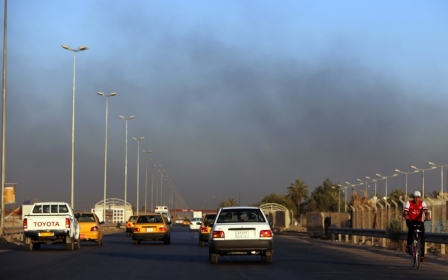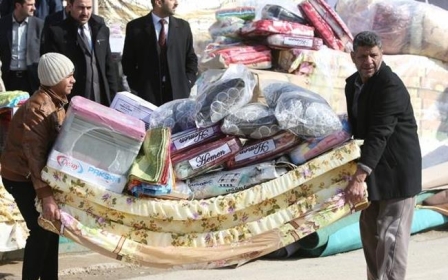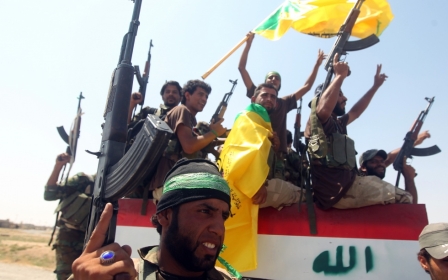Sunni Iraqi MPs boycott parliament over murder of tribal chief

Iraqi Sunni lawmakers said Sunday they were boycotting parliament after the murder of a senior tribal leader was blamed on Shiite militia, sparking fresh tensions between the two communities.
The boycott comes weeks after suspected Shiite gunmen in January murdered three Sunni clerics in Basra, a majority Shiite southern province, triggered outrage in a country mired in sectarian violence.
Sheikh Qassem Sweidan al-Janabi, his son and seven bodyguards were killed by gunmen after their convoy was ambushed late Friday in Baghdad, with most shot in the head, members of his tribe have said.
Janabi's nephew, MP Zeid al-Janabi, was with the group when they were ambushed but was later released unharmed.
The boycott by Sunni lawmakers -- who hold 73 seats in the 328-strong parliament -- was announced in a statement posted on the official Facebook page of Sunni parliament speaker Salim al-Juburi.
Representatives of Sunni parliamentary blocs held "an extraordinary meeting late Saturday... and agreed to suspend their parliamentary activities", said the statement released after an all-night meeting.
The politicians discussed the killings and "insisted on submitting to the government a draft resolution to ban militias and criminalise sectarianism", it said.
In Iraq the word "militias" is often used to refer to armed Shiites who have been fighting alongside government forces against the Islamic State group.
Sunni MP Nahida al-Daini told AFP that Sunni lawmakers "began observing from Saturday night an open-ended" boycott of parliament.
They also set up a commission tasked with holding negotiations with other parliamentary blocs, namely the formation of Shiite Prime Minister Haider al-Abadi.
Another Sunni MP, Ghazi al-Kuoud, said commission would aim "to put pressure on the prime minister to ban militias" and halt crime.
"We are not prepared to be partners with a government that cannot protect its citizens," he said, calling for Janabi's killers to be identified and prosecuted.
Friday's killings were not claimed by any group, but Abu Qusay, a cousin of Sheikh Janabi, accused "armed militias backed by some sides of the government" -- a reference to Shiite militias.
HRW: Shiite militias 'possibly war crimes' against civilians
On Saturday, officials and security sources said "gunmen manning a fake checkpoint stopped the convoy carrying MP Janabi and kidnapped all who were on board".
"They moved them to Sadr City, where they released the MP, then took the others and killed them. Their bodies were found next to Al-Nida'a mosque in northern Baghdad," a member of the lawmaker's staff said.
Sadr City is a vast Shiite neighbourhood in the north of the capital.
Abu Qusay told AFP that Sheikh Janabi had been shot in the head, like most of his bodyguards, while his son was killed by a bullet to the chest.
"People who carry state-issued weapons... and wear state-issued uniforms are behind the assassination," he said.
Abadi vowed in a statement to strike with an "iron fist" those who threaten Iraqi lives and pledged to hunt the killers and bring them to justice, saying they had wanted to "fracture" the country's political fabric.
Sheikh Janabi was a prominent figure in the religiously mixed areas south of Baghdad, often described as a key player in efforts to combat sectarianism.
He "had a known history of confronting terrorism, sectarianism and supporting national reconciliation", said MP Adnan al-Janabi.
Abu Qusay said Sheikh Janabi had recently called for Sunni residents to return to Jurf al-Sakhr, an area south of Baghdad which government troops backed by Shiite militias retook from IS in October.
In a report published Sunday, Human Rights Watch accused Shiite militias of "abuse, possibly war crimes" against civilians in Sunni areas which government forces and the militias recaptured from IS.
"Iraqi civilians are being hammered by ISIS and then by pro-government militias in areas they seize from ISIS," said HRW's deputy Middle East and North Africa director Joe Stork, referring to IS by another name.
In October Amnesty International made similar accusations against the Shiite militias.
The speaker of parliament has summoned the interior and defence ministers to address the legislature on Monday.
"Parliament will not remain silent in the face of acts that might undermine the authority of the state," Juburi said.
Middle East Eye propose une couverture et une analyse indépendantes et incomparables du Moyen-Orient, de l’Afrique du Nord et d’autres régions du monde. Pour en savoir plus sur la reprise de ce contenu et les frais qui s’appliquent, veuillez remplir ce formulaire [en anglais]. Pour en savoir plus sur MEE, cliquez ici [en anglais].




